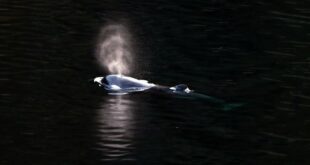Multiple revenue streams keep Jets airborne, but ticket revenue key to icing competitive team, Chipman says
The company that owns the Winnipeg Jets says it's never lost money since the NHL returned to Winnipeg in 2011, not even during a recent downturn in ticket sales at Canada Life Centre.
True North Sports & Entertainment has turned a profit on its combined hockey, arena and merchandising operations every year the NHL has been in Winnipeg, executive chair Mark Chipman said during a wide-ranging interview about the economics of operating a professional sports franchise in the smallest market in the National Hockey League.
As a privately held company, True North does not post its financial statements, leaving business publications such as Forbes magazineto speculate about the team's profits and losses.
True North has lost money on hockey operations alone, but has not ended up in the red overall since the former Atlanta Thrashers moved to Winnipeg in 2011 to become the Winnipeg Jets, Chipman said in the interview.
"From an overall perspective, no, we've never lost money in our NHL years. Previous years we did," Chipman said earlier this month, speaking in a boardroom at True North's offices in downtown Winnipeg.
While ticket sales for the Jets, Manitoba Moose, concerts and other events at Canada Life Centre make up the most important revenue source for True North, merchandising, broadcast rights and other revenue streams keep the company in the black, he said.
So does revenue-sharing within the NHL, as well as the league-mandated salary cap that limits team spending on the rosters to $83.5 million this year.
Chipman said the NHL would never have returned to Winnipeg without revenue sharing and the salary cap.
"This market would not survive without that, and that's a fact," he said, adding those revenue assumptions underlined the original decision to pursue the return to the NHL.

Winnipeg Jets co-owner Mark Chipman loves competing against big teams as a small market
15 hours ago
Mark Chipman says his company, True North Sports and Entertainment, has never lost money given all its revenue streams, including ticket sales, merchandising, broadcast rights and revenue sharing within the league. He adds True North's profits have been reinvested into the Canada Life Centre.
Economic impacts and government subsidies
According to figures published by True North last week, the various arms of the company have invested $1.6 billion in downtown Winnipeg real estate since 2004. True North contributes $616 million a year to the municipal and provincial economy, as well as $133 million to tax coffers at all three levels of government every year, the company states.
True North also receives municipal and provincial tax subsidies, which include a $576,000 property-tax break on Canada Life Centre, a $246,000 business tax refund, and the ability to collect approximately $6.5 million worth of entertainment taxes on events at the arena.
True North is also eligible to receive revenue from 140 gaming machines at the Shark Club inside Cityplace mall, under a provincial funding deal created by the former Greg Selinger NDP government to help True North survive future economic challenges.
While the province expected the gaming revenue to average approximately $5.5 million a year, Chipman said actual revenue from the Shark Club has been closer to $2.5 million a year, on average.
"It was never a guaranteed source of revenue," Chipman said. "It never went into the Jets P&L [profit and loss statement]. It always resided inside the building and it was directed at paying down debt.
"We thought it was important that we pay down as much debt as we could."
Chipman said True North has never taken a distribution from any profits it's realized since the NHL returned. Instead, he said, all of the team's profits have been reinvested into Canada Life Centre: $83 million since 2011, according to figures published by True North last week.
"We've almost invested as much in renovations as we have building it," he said, referring to a $133.5-million construction project conducted in 2003 and 2004.
"We don't look at it like a garden-variety business. You've probably heard us use the word stewards or trustees. Like, it's true. We own it because somebody has to own it, but it doesn't really belong to us."
Franchise values rising
Viewed from a long-term perspective, the Winnipeg Jets don't have to produce financial dividends in a league where franchise values are rising.
True North paid $170 million US to purchase the Atlanta Thrashers in 2011. Forbes magazine estimated the value of the Winnipeg Jets franchise at $780 million before news emerged last week that a prospective Salt Lake City NHL owner is willing to pay $1.2 billion for the Arizona Coyotes franchise.
"A lot of these owners get involved in their teams because they want the value of the club for resale someday," said Glen Hodgson, an Ottawa economist who specializes in professional sports.
Nonetheless, Chipman's comments about reinvesting profits are significant, considering skepticism exists about True North among elements of the Winnipeg Jets' fanbase.
In recent years, some vocal fans have claimed Chipman and True North are solely interested in extracting profit from ticket-buying fans. Some were outraged in February when Chipman toldThe Athleticthere would be consequences if the season-ticket base did not return to 13,000 seats from its current level of about 9,500.
"This place we find ourselves in right now, it's not going to work over the long haul. It just isn't," Chipman told The Athletic, prompting speculation the team owner was threatening to relocate the Jets.
Chipman insists his comment was poorly elucidated, and that he intended to say True North cannot continue spending close to the salary cap every year without selling more tickets to Jets games.
"In order to win, in order for fans to be engaged, you rightfully have to be doing everything you think you can to win," he said.
No fan of teardowns and rebuilds
Chipman went on to say that's why he was no fan of dismantling the core of this team last summer, as some hockey observers expected general manager Kevin Cheveldayoff to do, given former forward Pierre-Luc Dubois's desire to leave Winnipeg and the pending expiration of contracts for centre Mark Scheifele and goalie Connor Hellebuyck.
Instead of trading all three star players for draft picks, Cheveldayoff traded Dubois to Los Angeles for Gabriel Vilardi, Alex Iafallo and Rasmus Kapuri, adding more depth to the Jets' lineup as a result. Scheifele and Hellebuyck signed long-term contracts.
The 2023-24 Jets, which many hockey analysts expected to miss the playoffs, are now destined for a first-round playoff fight against the Colorado Avalanche.
Chipman strongly suggested he is no fan of tearing apart an NHL roster and rebuilding it.
"I've learned from people in this business who've been invaluable with their advice in terms of the fallacy of tearing down a team," he said. "I would challenge people to show me just what a rebuilding is. How do you do that?"
The Boston Bruins, he noted, did not engage in a teardown following their Stanley Cup win in 2011 and have been back to the Cup final twice since then.
"For the longest time, they kept [Patrice] Bergeron and [Brad] Marchand and on and on. They kept their core," he said.
Chipman insists True North is doing everything it can to win a Stanley Cup.
"Our singular purpose is to try and win. I wouldn't have got into this business if I didn't think that was achievable," he said.
"Believe me, I'm not trying to elicit any sympathy for anybody who's got themselves into this for a living, but it's a difficult business and it's really difficult to win.
"But I love that about it. I love the fact that we're the smallest market and then we get up every morning trying to compete against, you know, great big enterprises that have more resources, so we're trying to win."
Underdog mentality legitimate
The underdog mentality is legitimate, Hodgson said.
"Winnipeg was already challenged to begin with. It's by far the smallest market in the NHL. It's a long way from any other place. It has the smallest building," he said.
But Chipman said he is convinced Winnipeg is a large enough city, and possesses sufficient affluence to sustain an NHL franchise and succeed on the ice.
As evidence, he notes the Winnipeg Jets have won more regular-season games than any other Canadian NHL team — 517 as of an April 13 drubbing of Colorado – since the league returned to Winnipeg in 2011.
Chipman also finds himself with a fair degree of influence in the NHL. He now sits on the executive committee of the league's board of governors, which dictates policy directio for the broader group of NHL owners.
He attributes his presence on that committee as a matter of representation.
"I think it was more just a nod to the way we are operating, and perhaps the idea that it made sense to have one of the smallest markets represented," he said.
"I have to believe that's had something to do with it — that they try and spread out the influence across the league."
ABOUT THE AUTHOR
Senior reporter, CBC Manitoba
Bartley Kives joined CBC Manitoba in 2016. Prior to that, he spent three years at the Winnipeg Sun and 18 at the Winnipeg Free Press, writing about politics, music, food and outdoor recreation. He's the author of the Canadian bestseller A Daytripper's Guide to Manitoba: Exploring Canada's Undiscovered Province and co-author of both Stuck in the Middle: Dissenting Views of Winnipeg and Stuck In The Middle 2: Defining Views of Manitoba.
*****
Credit belongs to : www.cbc.ca
 MaharlikaNews | Canada Leading Online Filipino Newspaper Portal The No. 1 most engaged information website for Filipino – Canadian in Canada. MaharlikaNews.com received almost a quarter a million visitors in 2020.
MaharlikaNews | Canada Leading Online Filipino Newspaper Portal The No. 1 most engaged information website for Filipino – Canadian in Canada. MaharlikaNews.com received almost a quarter a million visitors in 2020.







